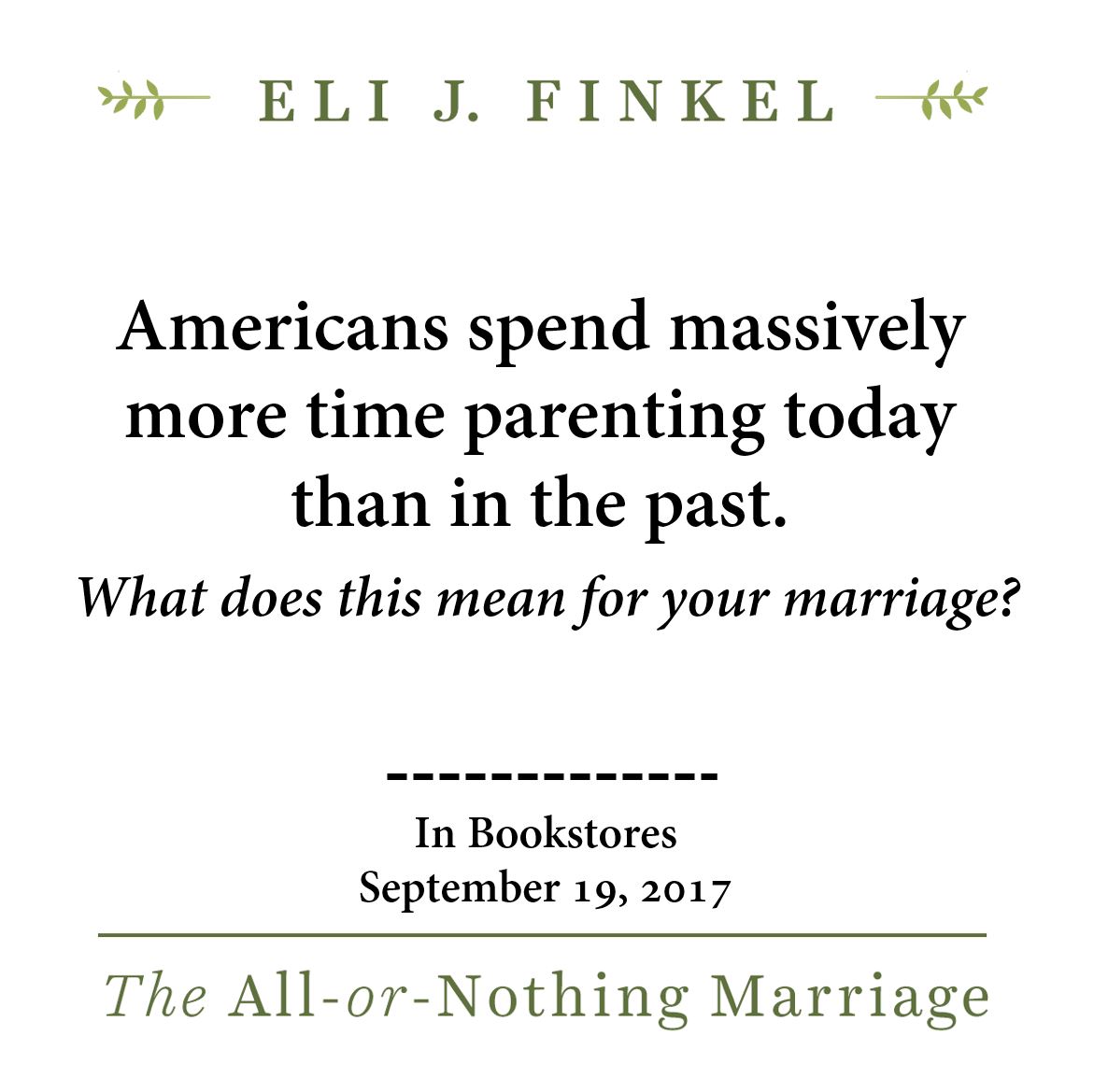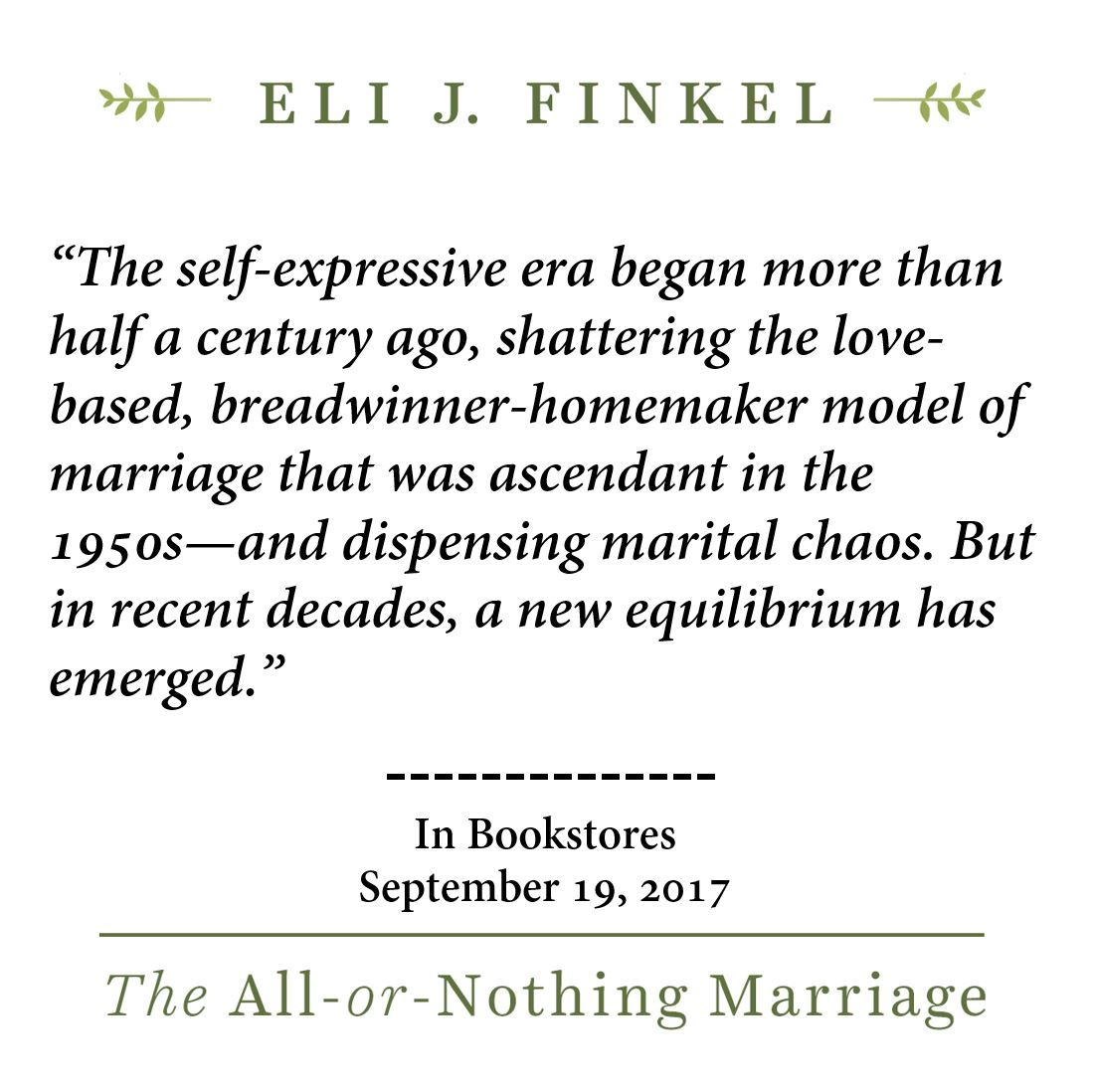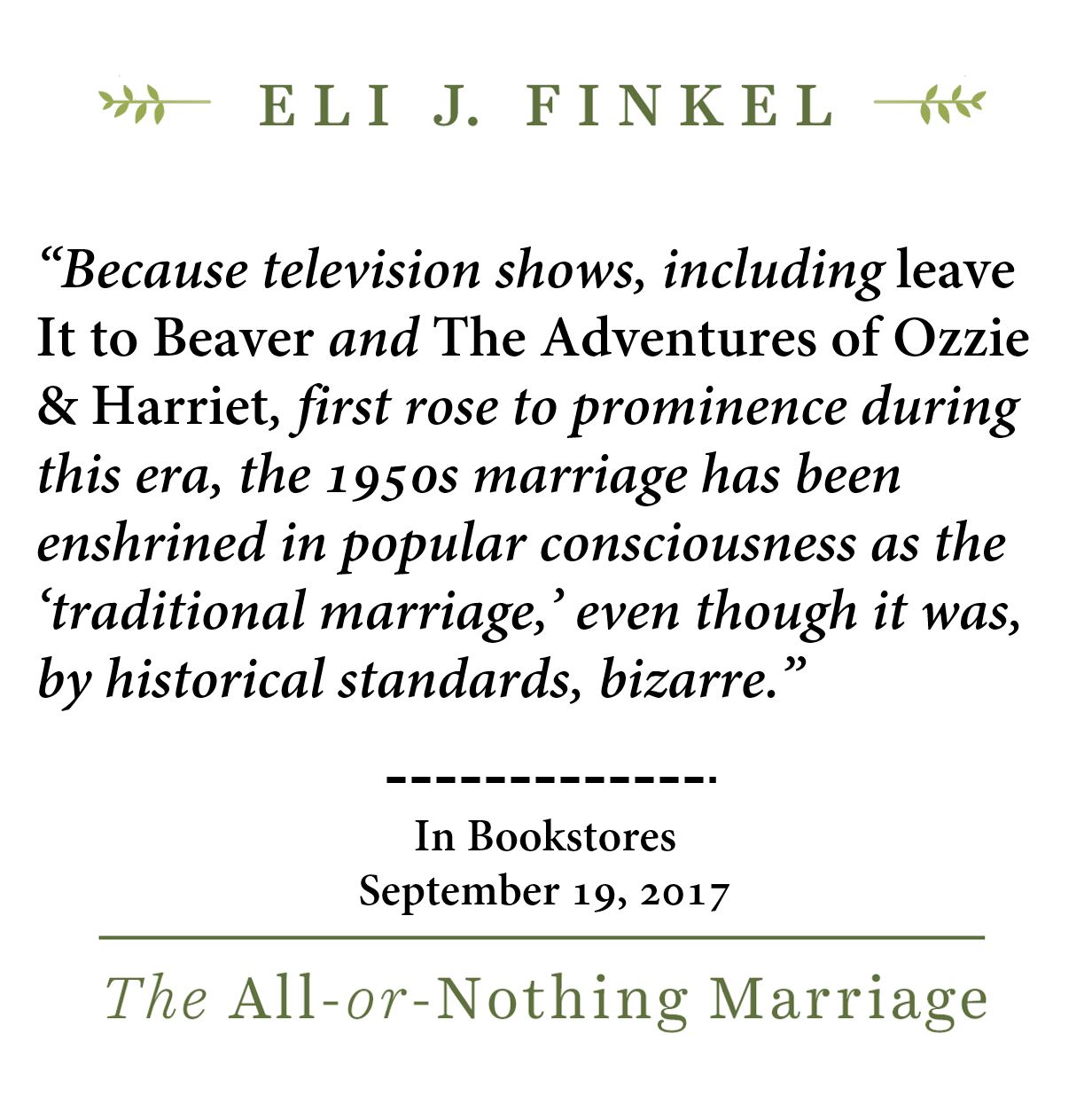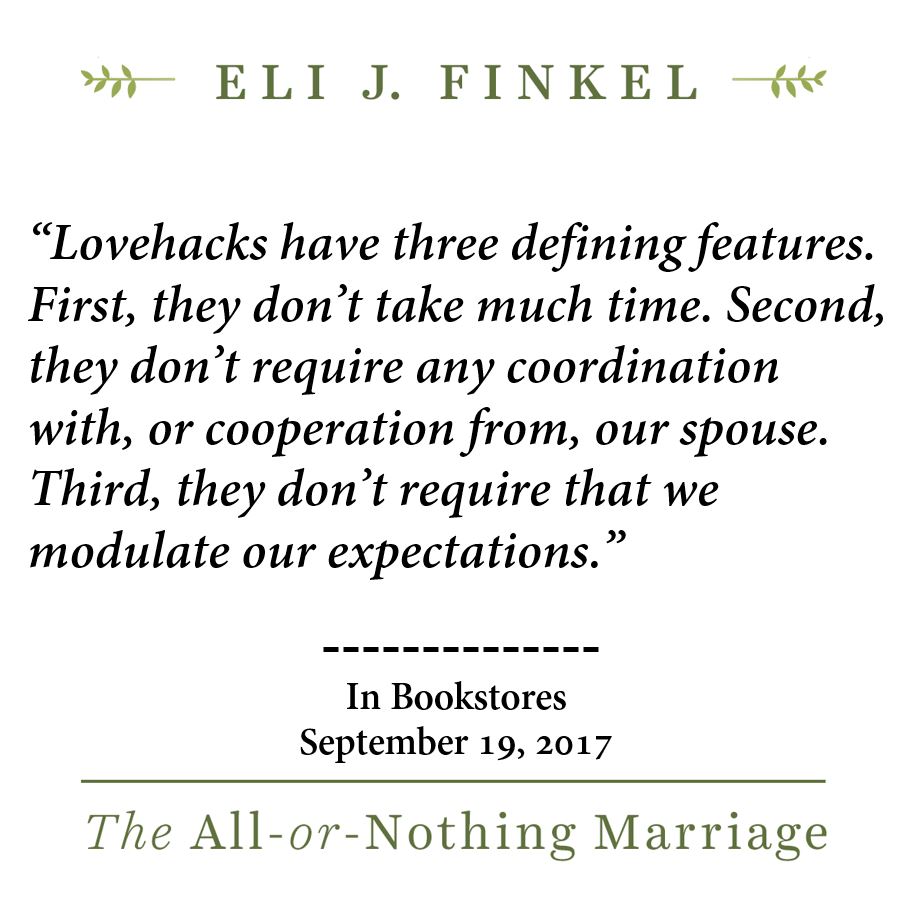Dedication
"To my wife, Alison, who thinks it's hilarious that I'm a marriage expert."
Buy Now
Amazon • Barnes & Noble • Books-A-Million • Indie Bound • iBooks
About the Book
The structure of successful marriages is revealed in this inspiring and practical new perspective on Americans’ most important relationship.
The institution of marriage in America is struggling. But, as Eli J. Finkel’s most recent research reveals, the best marriages today are better than the best marriages of earlier eras. Indeed, they are the best marriages the world has ever known.
This engaging and provocative book, which is ideal for book clubs, reverse engineers the best marriages—from the traditional to the utterly nontraditional—showing how any marriage can be better.
Finkel provides a sweeping historic overview, showing that the primary functions of marriage from 1620 to 1850 revolved around food, shelter, and protection from violence. From 1850 to 1965, the primary functions increasingly revolved around love, companionship, and sexual fulfillment. Nowadays, a new kind of marriage has emerged, one that can promote self-discovery, self-esteem, and personal growth like never before.
Finkel combines cutting-edge scientific research with practical advice, introducing a set of quick-and-dirty lovehacks, considering tactics for optimizing communication and responsiveness, and offering guidance on when to recalibrate our expectations. Collectively, these strategies help not only to solve acute problems but also to put our marriage on a path toward flourishing for the long run.
Praise for The All-Or-Nothing Marriage
New York Times: “An important book ... full of interesting insights on contemporary marriage”
Scientific American: “An excellent book”
Chicago Tribune :“A fantastic new book"
Huffington Post: "An impressive work that not only charts the history of marriage from hunter-gatherers onwards and explores all the ways marriage has evolved over the years but also boils the wealth of data to simple, attainable advice"
Wall Street Journal: “Mr. Finkel's book shares research on what happens in the best marriages, with the aim to help everyone else likewise score an 'all' rather than a 'nothing' partnership."
Time: "Finkel's optimistic, data-driven attempt to capture what couples are striving for, even in the face of cultural and economic headwinds, is like a good, steadying drink. Keep calm and marry on."
Economist: "Mr Finkel [is] one of the leading lights in the realm of relationship psychology. ... In his candid first book, 'The All-or-Nothing Marriage,' Mr Finkel examines both how he and his wife survived the worst, and how other couples might do the same."
Aziz Ansari and Eric Klinenberg, co-authors of the #1 New York Times bestseller Modern Romance: “Eli Finkel has written an incredible analysis of the state of marriage, and a useful guide for everyone trying to make their relationship work better. He also promised us cheeseburgers if we wrote this blurb. Please get those to us ASAP, Eli.”
Carol Dweck, author of Mindset: The New Psychology of Success: “After years of debate and inquiry, the key to a great marriage remained shrouded in mystery. Until now. In his All-or-Nothing Marriage, Eli Finkel reveals the fascinating ways in which marriage has evolved and the things we can all do to help this all-important relationship flourish. You will definitely want to read this book.”
Daniel Gilbert, author of Stumbling on Happiness: “In his deeply insightful and beautifully written book on the paradox of modern marriage, Eli Finkel shines the bright light of science on the most important, rewarding, and vexing of all human relationships.”
Adam Grant, New York Times bestselling author of Give and Take, Originals, and Option B (coauthored with Sheryl Sandberg): “If you’ve ever wondered what science has to say about how marriage has changed over time and what makes for a great one, this is the book to read. Eli Finkel is one of the world’s leading experts on relationships, and his insights are both comprehensive and revealing.”
Book Club Questions
Societal Questions
1. Eli observes that Americans today often initiate divorce because they aren’t sufficiently in love with their spouse or because they feel stagnant in their marriage. These are major changes from earlier eras, during which such reasons would have been viewed as inadequate to justify divorce. Do you think these changes are good or bad for individual Americans and for society as a whole? Why?
2. The All-Or-Nothing Marriage reports that the median age at first marriage surged from 22 and 20 (for men and women, respectively) in the 1950s to 29 and 28 today. Along the way, marriage shifted from a first major step on the transition to adulthood to one of the last steps—a capstone event to be achieved after completing one’s education, living independently, launching a career, and so forth. What effects, if any, do you think this change has had on the economy, popular culture, public health, policymaking, or any other aspect of society?
3. Eli presents evidence that high-investment parenting has surged over the past generation or two. This change is part of a broader process of “nuclearization” of family life, in which Americans are spending more time in their nuclear family units and less time with a broader network of friends and family members. Are these changes good or bad for the institution of marriage—and for society as a whole?
4. In the Preface, Eli states that The All-Or-Nothing Marriage is neither a liberal nor a conservative book: “This is a pro-marriage book, but that doesn’t mean it’s a book for conservatives. It’s a book that recognizes the value of lifestyle flexibility, but that doesn’t mean it’s a book for liberals.” And yet, the book certainly has implications for hot-button political issues. In your view, what are those implications? For example, is there anything that policymakers can or should do to strengthen marriage among poorer, less educated Americans?
5. In the Recalibration chapter (Chapter 11), Eli explores the somewhat radical idea that some couples might benefit from engaging in some form of consensual nonmonogamy (a practice that is distinct from “cheating” or “infidelity” in that it is truthful and honest). What’s your reaction to this idea? Do you believe that monogamy is always the best option in marriage or that each couple should make that decision for itself? Why? If you think each couple should decide for itself, under what circumstances do you think monogamy or consensual nonmonogamy is likely to be the better option?
6. Some thought leaders have suggested that the “until death do us part” ethos of marriage no longer makes sense in an era when it’s easy to survive as an unmarried person and when we live so long. They argue that marriage should instead function as a contract for, say, 5 or 10 years, with the contract renewing if both spouses favor renewal. Eli doesn’t address this issue directly, but The All-Or-Nothing Marriage can help us think more clearly about radical suggestions along those lines. Given what we now know about marriage, what do you think of the renewable contract idea? Would our society, and the individuals within our society, be better or worse off if we changed the “until death do us part” ethos to a renewable contract approach?
Personal Questions
1. If you’re currently married, in what ways do you and your spouse lovehack, go all in, and recalibrate? Did reading the book bring to mind new ways that you can use these strategies?
2. If you’re not currently married but open to marrying someday, did reading this book change anything about the sort of marriage you’d like develop someday? Why or why not?
3. Eli argues that the expectations Americans bring to our marriages have shifted over time from the bottom to the top of Maslow’s hierarchy -- from needs revolving around basic survival to more psychologically complex needs like love and self-actualization. To what extent would your spouse (or, if you’re single, your ideal spouse) be a good fit for you if you lived in 1750 or 1950 rather than today?
4. Many strategies for improving our marriage involve making sacrifices and giving our partner the benefit of the doubt. It’s hard to achieve a successful marriage without doing those things, but doing them can leave us vulnerable to exploitation. How can you work to improve your marriage while simultaneously ensuring that your spouse isn’t taking advantage of your goodwill? Relatedly, given that deep intimacy requires some level of tradeoff between relationship enhancement and self-protection, which risk are you more willing to take—are you more willing to let yourself be highly vulnerable in pursuit of deep intimacy, or are you more willing to sacrifice some level of intimacy to avoid being highly vulnerable?
Countdown Tweets
T - 21 Days
T - 20 Days
T - 19 Days
T - 18 Days
T - 17 Days
T - 16 Days
T - 15 Days
T - 14 Days
T - 13 Days
T - 12 Days
T - 11 Days
T - 10 Days
T - 9 Days
T - 8 Days
T - 7 Days
T - 6 Days
T - 5 Days
T - 4 Days
T - 1 Day























